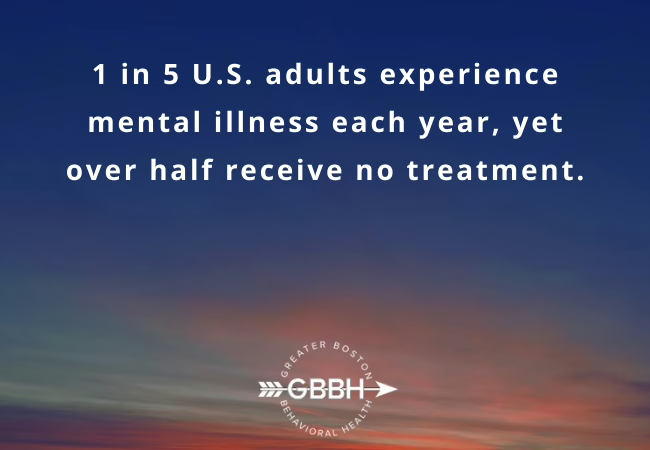Watching someone you care about struggle with their mental health can leave you feeling helpless. You see their suffering. You want them to get help. Yet bringing up the idea of enrolling in a structured mental health program—like an Intensive Outpatient Program (IOP) or a Partial Hospitalization Program (PHP)—can be delicate.
At Greater Boston Behavioral Health, we know that approaching this conversation with care, compassion, and clear information can make all the difference. Whether you’re concerned about depression, trauma, substance use, or emotional instability, the way you open the door to treatment matters.
This guide will help you navigate the conversation skillfully, so you can encourage your loved one to consider professional help without judgment, guilt, or pressure.
Understand Why Someone May Resist Help
Before initiating the conversation, it’s crucial to recognize that resistance is normal. People often hesitate to seek mental health treatment due to:
- Fear of being labeled or judged
- Shame or guilt about needing help
- Anxiety about changing familiar (even unhealthy) patterns
- Concerns about cost, time, or stigma
- Previous negative experiences with therapy or treatment
Acknowledging these fears can help you approach the conversation with empathy rather than frustration.
Recognize the Signs That a Higher Level of Care May Be Needed
Your instincts to seek help for your loved one may be right if you notice:
- Increasing emotional instability, anger, or withdrawal
- Difficulty managing work, school, or relationships
- Substance use as a coping strategy
- Thoughts or talk of hopelessness, self-harm, or suicide
- Failure to respond to traditional outpatient therapy
- Disruptive behavior that endangers themselves or others
Structured options like a Partial Hospitalization Program in Boston or a Residential Treatment Program in Boston may provide the intensive, multidisciplinary support they need.
Prepare Thoughtfully Before You Talk
Doing your homework shows respect and commitment. Before initiating the conversation:
- Research the types of programs available (e.g., IOP, PHP, Inpatient Treatment Program in Boston)
- Understand evidence-based therapies like Cognitive Behavioral Therapy Boston (CBT) and Dialectical Behavior Therapy in Boston (DBT)
- Gather information about flexible programs like Mental Health Programs in Boston that allow work/school participation
- Find contact information for trusted providers like Greater Boston Behavioral Health
- Mentally rehearse supportive phrases you can use
Preparation empowers you to speak calmly, confidently, and compassionately.
Best Practices for Having the Conversation
Choose the Right Setting
- Find a quiet, private place where your loved one feels safe
- Avoid bringing it up during heated arguments, family events, or crisis moments
Use Compassionate Language
Frame your observations with love and concern:
- ✅ “I’ve noticed you’ve been carrying a lot lately, and I’m worried about you.”
- ✅ “You don’t have to face this alone. I’m here to help you find support.”
Avoid Blame or Ultimatums
- ❌ “You’re ruining your life—you need help.”
- ✅ “I want to help you find ways to feel better. I believe healing is possible.”
Offer Concrete Next Steps
Have options ready:
- “There’s a program nearby that specializes in what you’re dealing with—would you be open to learning about it?”
- “I can help you set up a consultation call with Greater Boston Behavioral Health if you want.”
How to Handle Emotional Reactions
Your loved one may respond with anger, sadness, denial, or withdrawal. Stay calm and non-reactive:
- Validate their feelings: “It’s okay to feel scared or overwhelmed. This is a big step.”
- Avoid pushing too hard: If they say “no” at first, leave the door open gently for later conversations.
- Offer ongoing support: Let them know you’re there for them, regardless of their immediate decision.
Sometimes, multiple conversations are needed before someone is ready to accept help. Patience can be powerful.
Framing the Benefits of Enrolling in a Mental Health Program
Focus not just on what’s wrong, but on what’s possible with the right support:
- Learn coping strategies for depression, anxiety, anger, or trauma
- Build skills for better relationships and communication
- Receive psychiatric care in Boston for medication support, if needed
- Regain confidence, energy, and hope
- Develop long-term strategies for stability and independence
Programs like Greater Boston Behavioral Health’s PHP, IOP, and residential services combine individual therapy, group therapy, psychiatric care, and skill-building for comprehensive healing.
Levels of Care to Consider at Greater Boston Behavioral Health
Depending on their needs, your loved one may benefit from:
| Program | Best For |
|---|---|
| Outpatient Therapy | Mild to moderate symptoms, maintenance care |
| Intensive Outpatient Program (IOP) | Moderate symptoms needing more than weekly therapy |
| Partial Hospitalization Program (PHP) | Severe symptoms needing daily structured care |
| Residential Treatment Program | Complex trauma, emotional dysregulation needing 24/7 support |
| Inpatient Treatment Program | Acute psychiatric crises needing immediate stabilization |
Every program includes evidence-based practices like CBT, DBT, and Anger Management Therapy in Boston, and provides access to coordinated psychiatric care.
Why Choose Greater Boston Behavioral Health?
At Greater Boston Behavioral Health, your loved one will receive:
- Individualized treatment plans focused on their goals, strengths, and challenges
- Expert clinicians specializing in trauma, emotional regulation, anxiety, depression, and dual diagnosis
- Integrated psychiatric support for diagnosis and medication management
- Culturally sensitive, inclusive, and compassionate care
- Seamless transitions between outpatient, IOP, PHP, residential, and inpatient services
We don’t just treat symptoms—we empower transformation, resilience, and hope.
Conclusion
It takes strength to notice when someone you love needs more help than you alone can give. It takes even more strength to start the conversation that could change their life.
By approaching with preparation, compassion, and patience, you can help your loved one move from fear and isolation to connection and recovery. At Greater Boston Behavioral Health, we are ready to walk beside them—and you—every step of the way. Call (888) 278-0716 to schedule a confidential consultation. Healing is possible—and it can start today.
FAQ on Talking to a Loved One About Mental Health Programs
How do I know if my loved one needs a mental health program?
Signs include emotional instability, difficulty functioning in daily life, substance use, severe depression or anxiety, or withdrawal from relationships and responsibilities.
What’s the best way to bring up mental health treatment?
Use “I” statements, express genuine concern without blame, choose a private and calm setting, and have resources ready if they are open to learning more.
What if my loved one refuses to get help?
Stay patient. Sometimes, it takes multiple conversations before someone is ready. Keeping communication open and non-judgmental is critical.
What mental health programs are available at Greater Boston Behavioral Health?
We offer outpatient therapy, Intensive Outpatient Programs (IOP), Partial Hospitalization Programs (PHP), Residential Treatment Programs, and Inpatient Treatment Programs—all with integrated psychiatric care.
Can someone work or attend school while enrolled in a mental health program?
Yes. Programs like IOP are designed with flexibility so individuals can continue daily responsibilities while receiving intensive therapeutic support.


